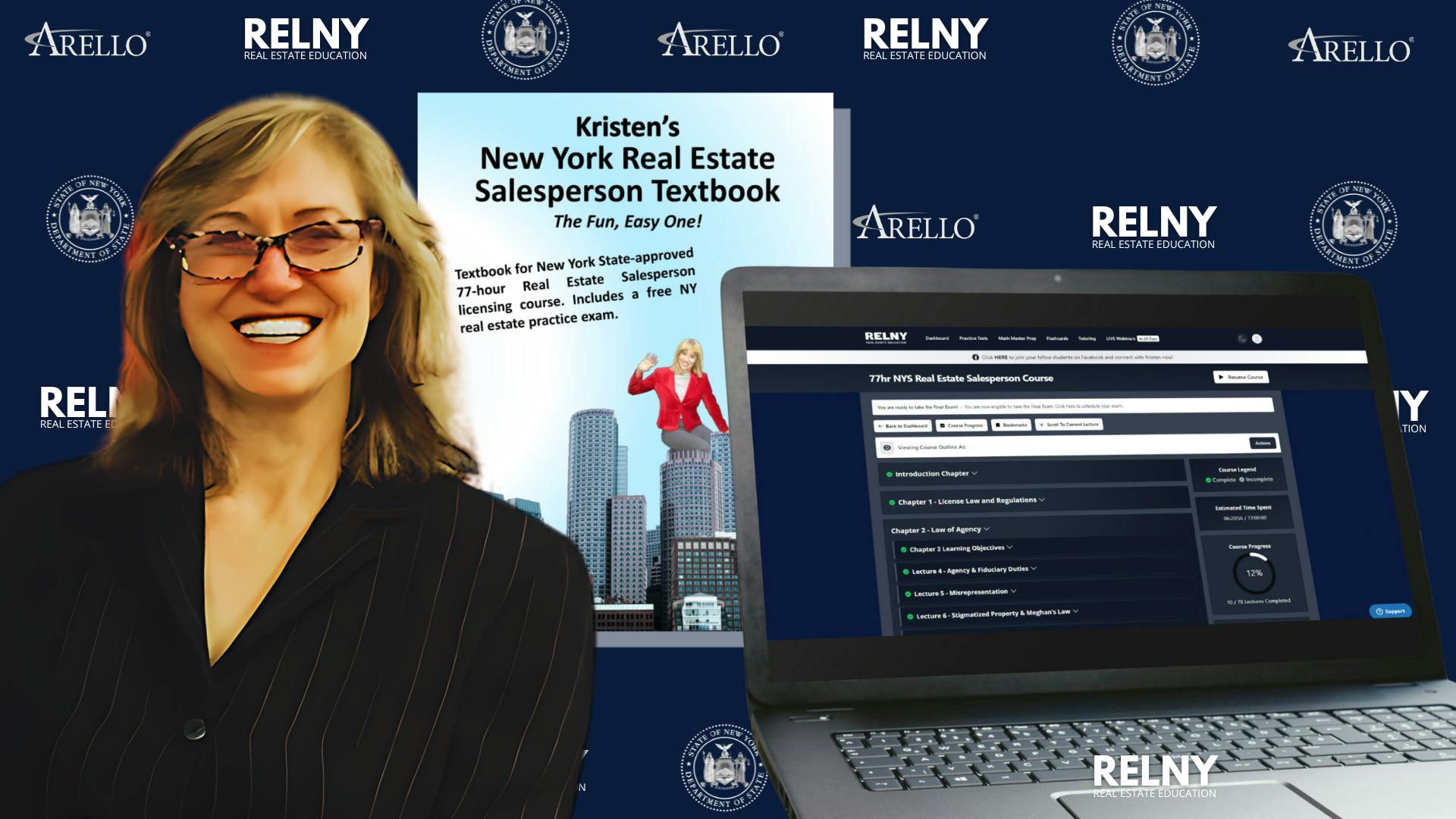Understanding the Civil Rights Act of 1866 for Real Estate
Essential Knowledge for Real Estate Licensing Students

-
Course Certified & Accredited by NYS DOS & ARELLO®
-
77 Hour NYS Real Estate Salesperson Licensing Course
-
Live Office Hours with Kristen
-
Take Final Exam at Home
-
Kristen's 1:1 Private Tutoring
-
Subtitles/Transcripts for all languages offered by NYS DOS
-
Call/Text (877) 997-3569
The Civil Rights Act of 1866 for Real Estate
As an aspiring real estate agent in New York, it's crucial to have a comprehensive understanding of various laws and regulations that shape the real estate landscape. One such pivotal law is the Civil Rights Act of 1866. In this article, we'll delve into the key aspects of this historic legislation and its implications for real estate professionals. By the end, you'll have a solid grasp of the Civil Rights Act of 1866, which will not only help you in passing your real estate licensing exam but also in practicing fair and ethical real estate transactions.
The Historical Context of the Civil Rights Act of 1866
The Civil Rights Act of 1866 was a landmark piece of legislation passed in the aftermath of the American Civil War. It was enacted on April 9, 1866, and was the first federal law to define and protect the civil rights of all citizens within the United States. This Act was particularly significant because it aimed to eliminate the racial discrimination that was rampant during that era, particularly against African Americans who had recently been emancipated from slavery.
Key Provisions of the Civil Rights Act of 1866
The Civil Rights Act of 1866 is codified in 42 U.S.C. § 1981. Here are the key provisions that are most relevant to real estate professionals:
- Equal Rights Under the Law
The Act declares that all persons born in the United States are citizens, regardless of race, color, or previous condition of servitude. This provision established the foundation for equality in civil rights for all citizens.
- Property Rights
One of the most critical aspects of the Act for real estate professionals is its emphasis on property rights. The Act states that all citizens have the same right to inherit, purchase, lease, sell, hold, and convey real and personal property. This means that racial discrimination in any real estate transaction is prohibited.
- Enforcement and Legal Recourse
The Act provides that individuals who face discrimination have the right to seek legal recourse. This includes the ability to sue for damages and obtain relief through the courts.
The Impact of the Civil Rights Act of 1866 on Real Estate Practices
Understanding the implications of the Civil Rights Act of 1866 is essential for real estate agents, as it directly influences how you conduct your business. Here’s how this Act impacts real estate practices:
- Prohibition of Racial Discrimination
As a real estate agent, you must ensure that all your actions, whether in selling, leasing, or renting properties, are free from racial discrimination. This applies to advertising properties, showing homes, negotiating prices, and closing deals.
- Fair Housing Compliance
The Civil Rights Act of 1866 laid the groundwork for subsequent fair housing laws, including the Fair Housing Act of 1968. Familiarizing yourself with these laws ensures you adhere to all regulations designed to promote equal housing opportunities for everyone.
- Ethical Responsibilities
Beyond legal compliance, understanding this Act underscores the ethical responsibility real estate agents have in fostering inclusive and equitable communities. Upholding these principles enhances your reputation and trustworthiness as a professional.
Practical Scenarios and Examples
Let’s consider a few scenarios to illustrate the application of the Civil Rights Act of 1866 in real estate transactions:
- Advertising Listings
When creating advertisements for property listings, ensure that the language used is inclusive and non-discriminatory. For example, avoid phrases like “ideal for single professionals” or “exclusive neighborhood,” which might imply exclusion based on race or family status.
- Showing Properties
While showing properties, treat all potential buyers or renters equally. Show the same properties to everyone interested and provide the same level of information and assistance, regardless of their race or ethnicity.
- Negotiating Offers
When presenting offers to sellers, do so without bias. Ensure that sellers are aware that they cannot reject offers based on the race or color of the prospective buyer.
Preparing for Your Real Estate Licensing Exam
To pass your real estate licensing exam, it's important to understand not only the historical context and key provisions of the Civil Rights Act of 1866 but also its practical applications in real estate. Here are some tips to help you prepare:
- Study the Law
Make sure you read and understand the text of the Civil Rights Act of 1866. Familiarize yourself with the specific language used and the rights it guarantees.
- Review Case Studies
Look at historical and contemporary case studies where the Civil Rights Act of 1866 has been applied in real estate. This will give you a clearer understanding of how the law is enforced.
- Practice Exam Questions
Engage in practice questions related to fair housing laws and the Civil Rights Act of 1866. This will help reinforce your knowledge and prepare you for similar questions on the exam.
- Stay Informed
Keep abreast of current events and changes in real estate law. Understanding the evolution of civil rights legislation will provide a deeper context for your exam and future career.
Get Started on Your Real Estate Career at RELNY
The Civil Rights Act of 1866 is a cornerstone of civil rights legislation in the United States, with significant implications for the real estate industry. As a future real estate agent, understanding this Act is crucial not only for passing your licensing exam but also for conducting your business in an ethical and lawful manner. By promoting equality and fairness in all your transactions, you contribute to building a more inclusive and just society.
At RELNY, we are committed to educating students and the success of your Real Estate career. By thoroughly understanding the Civil Rights Act of 1866, you’ll be well-equipped to excel in your real estate career and contribute to a fair and equitable real estate market.

Complete List of RELNY Real Estate Accreditations
RELNY is proud to be fully accredited by both the New York State Department of State (NYS DOS) and the Association of Real Estate License Law Officials (ARELLO®). This accreditation is more than just a formal recognition; it serves as a testament to the high standards of education and training we provide in the real estate sector.
RELNY's Unparalleled Learning Advantage
Kristen Bacorn's Online Real Estate Courses are Produced Exclusively for RELNY. As New York’s #1 Real Estate Instructor, Kristen’s engaging teaching style and comprehensive curriculum make RELNY the ideal choice for anyone looking to excel in real estate.
Unlock Success with RELNY: Purpose-Built Course Software
In the fast-paced world of real estate education, having the right tools can make all the difference between merely passing an exam and truly excelling in your career. RELNY’s purpose-built course software offers a suite of features designed to elevate the learning experience, making it easier, more engaging, and highly effective for students.
Meet RELNY's Kristen Bacorn, New York's #1 Real Estate Instructor
• NYS Department of State & ARELLO® Certified
• Masters, Harvard University
• Commercial & Residential Real Estate Broker
• Educator at RELNY, SUNY, CUNY, NAR, AIA
• Addressed the United Nations 2X
• Interviewed by Wall St. Journal & New York Times
RELNY FAQs
At RELNY, we understand that embarking on a career in real estate is a significant step, and choosing the right educational path is crucial. As the premier New York real estate school, we are dedicated to providing our students with the highest quality education and support. This FAQ page is designed to address some of the most common questions prospective and current students have about our courses and exam prep.
RELNY Job Placement Solutions: Your Bridge to Success
At RELNY, we are committed to more than just providing a top-tier real estate education—we're dedicated to ensuring our students thrive in their careers post-graduation. Our comprehensive Job Placement Solutions & Services are designed to support you every step of the way as you transition from being a student to a successful real estate professional.
Become a Licensed Real Estate Agent with RELNY Instructor Kristen Bacorn
Learn how to become a New York real estate agent from Kristen Bacorn - the #1 Real Estate Instructor in New York. Our accredited New York real estate licensing course can be completed in 1 week and can be taken online from the comfort of your home, or from your mobile phone.







